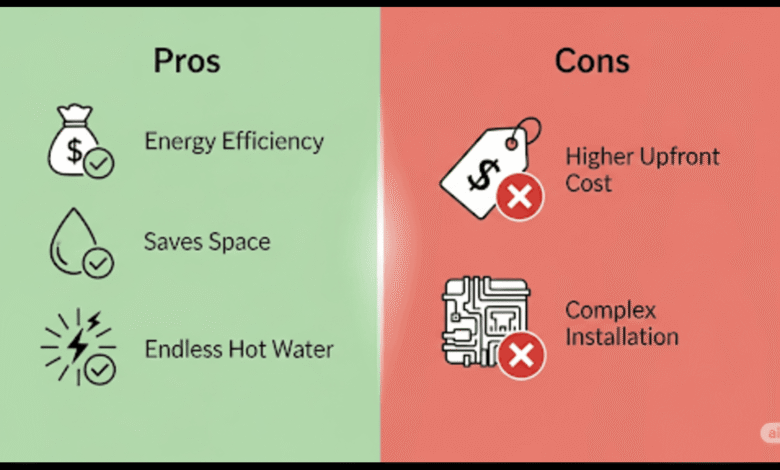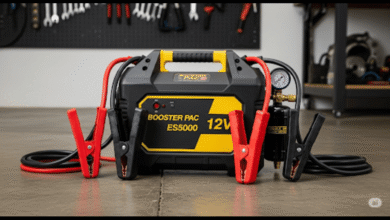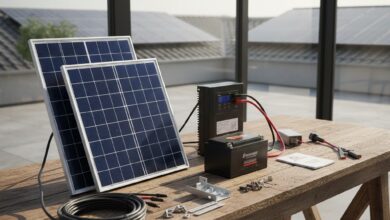Tankless Water Heater Pros and Cons: Is It the Right Choice for You?

Tankless water heaters, also known as on-demand water heaters, have been gaining popularity in recent years. With promises of energy efficiency, endless hot water, and sleek designs, they seem like a modern upgrade to traditional water heating systems. But are they really worth the investment?
In this article, we’ll explore the pros and cons of tankless water heaters, helping you decide if it’s the right option for your home. Whether you’re building a new house, upgrading your current system, or simply curious about your options, this guide will give you the clarity you need.
Pros of Tankless Water Heaters
1. Endless Hot Water
One of the biggest selling points of tankless water heaters is that they heat water on demand. As long as the unit is properly sized for your household, you’ll never run out of hot water—no more cold showers after three people have used the bathroom.
2. Energy Efficiency
Tankless systems only heat water when you need it, meaning they aren’t constantly running to keep a tank warm. According to the U.S. Department of Energy, homes that use 41 gallons or less of hot water daily can achieve 24%–34% more energy efficiency with a tankless system.
3. Space Saving
These systems are compact and typically wall-mounted. If you’re tight on space, especially in smaller homes or apartments, this is a major plus compared to a bulky traditional tank.
4. Longer Lifespan
A quality tankless water heater can last up to 20 years, which is about 5–10 years longer than traditional tank heaters. While the upfront cost is higher, the longer lifespan can balance the investment over time.
5. Lower Risk of Water Damage
Traditional tanks can leak or burst, leading to costly water damage. Since tankless systems don’t store water, this risk is significantly reduced.
Cons of Tankless Water Heaters
1. Higher Upfront Costs
Installation and purchase costs for tankless systems can be 2–3 times higher than tank models. This includes the unit itself and potential modifications to your plumbing or electrical system.
2. Limited Flow Rate
If multiple people are showering, running the dishwasher, and doing laundry all at once, a single tankless unit may struggle to keep up. You might need to install multiple units in larger households, which increases cost.
3. Inconsistent Temperatures
Some users report inconsistent water temperatures, especially when switching between faucets or during low-flow conditions. This is often caused by incorrect sizing or setup.
4. Requires Maintenance
Hard water can cause scale buildup inside the unit, especially in areas without a water softener. Regular descaling or flushing is required to maintain efficiency and avoid damage.
5. Installation Complexity
Installation can be tricky. You might need upgraded gas lines, venting, or electrical panels, depending on your existing setup. This can drive up labor and material costs.
Ideal Candidates for Tankless Water Heaters
Tankless water heaters work best for:
- Households with low to moderate water usage
- Smaller homes or apartments with limited space
- Energy-conscious homeowners looking to cut utility bills
- Homes in warm climates, where incoming water doesn’t need to be heated as much
- People planning to stay in their home long-term, to justify the initial cost
FAQs: Tankless Water Heater Pros and Cons
Q1: Do tankless water heaters really save money?
A: Over time, yes. While the upfront cost is higher, tankless systems save on energy bills due to their efficiency. The actual savings depend on your water usage and local energy rates.
Q2: How long does a tankless water heater last?
A: On average, 18–20 years. With proper maintenance, some units can last even longer.
Q3: Can a tankless water heater supply enough hot water for a large family?
A: It depends on the unit’s size (measured in GPM—gallons per minute) and how many appliances are running simultaneously. Larger homes may require multiple units or a hybrid solution.
Q4: Are electric or gas tankless heaters better?
A: Gas models tend to have higher flow rates and are better for larger households. Electric models are more compact and efficient in smaller homes or places where gas isn’t available.
Q5: What kind of maintenance is needed?
A: Annual flushing is recommended, especially in hard water areas. This prevents mineral buildup, which can damage internal components and reduce efficiency.
Q6: Can I install a tankless water heater myself?
A: It’s possible, but not recommended unless you have plumbing and electrical experience. Professional installation ensures proper sizing, venting, and code compliance.
Q7: Is it worth switching from a tank to tankless?
A: If you’re looking for long-term energy savings, want to free up space, and are willing to invest upfront, then yes—it can be a smart upgrade. But for short-term stays or budget constraints, a traditional tank might be more practical.
Final Verdict
Tankless water heaters offer modern, efficient, and space-saving benefits that appeal to today’s homeowners. But they’re not perfect for everyone. The higher initial cost and maintenance requirements can be deal-breakers for some.
If you’re in a smaller household or want long-term efficiency, a tankless unit could be a worthwhile investment. But if your water demand is high and budget is tight, sticking with a high-efficiency tank model may be more cost-effective.




